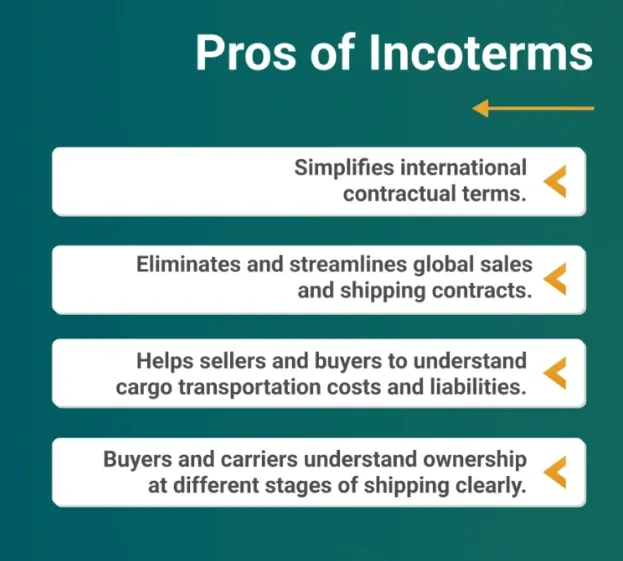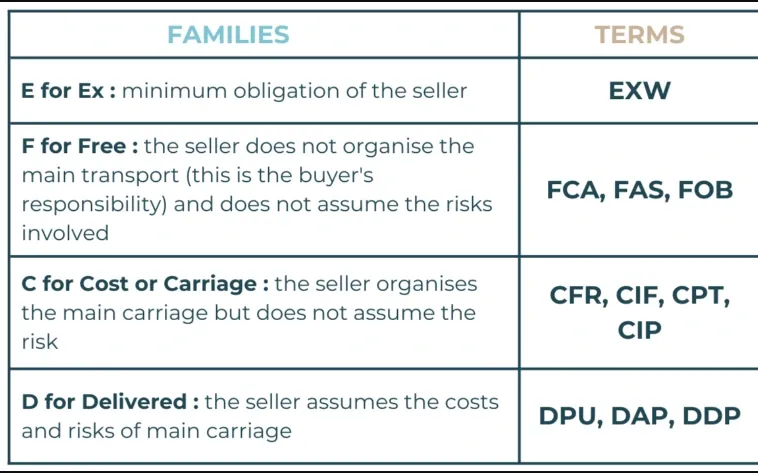What Are Incoterms?
Incoterms, short for International Commercial Terms, are a globally recognized set of rules developed by the International Chamber of Commerce (ICC).
Introduced in 1936, Incoterms provide standardized terms that clearly define the responsibilities of buyers and sellers in international trade transactions. These rules specify who is responsible for shipping, insurance, and various customs-related costs, ensuring smoother cross-border trade.
Incoterms are critical in mitigating confusion and disputes in international shipping, making them an essential tool for businesses involved in global trade. From small businesses exporting their products for the first time to large multinational corporations, understanding and using the right Incoterm is key to managing costs and risks effectively.
Benefits of Incoterms
Incoterms offer several advantages that streamline international trade and simplify the relationship between buyers and sellers
Clarity in Responsibilities and Costs
One of the primary advantages of Incoterms is that they clearly delineate who is responsible for specific costs, including shipping, insurance, and customs duties.
For example, under CIF (Cost, Insurance, and Freight), the seller covers the shipping and insurance costs up to the destination port, minimizing the buyer's involvement in these areas. This clear division of responsibilities helps avoid misunderstandings and ensures that both parties know exactly what is expected from them.

Reduces Disputes Between Buyers and Sellers
By providing precise definitions of each party’s obligations, Incoterms reduce the chances of disputes.
For instance, if there is an issue with a shipment, such as delays or damage, Incoterms determine who is at fault, allowing for swift resolution. Clear guidelines help both parties avoid lengthy and costly legal battles over accountability.
Streamlines International Shipping Processes
Since Incoterms are recognized worldwide, they help standardize contracts used in international trade.
This uniformity is particularly beneficial when shipping goods across multiple countries, as it eliminates the need to renegotiate terms with each party. The standardization simplifies and speeds up shipping processes, ensuring smooth transactions.
Risk Management
Incoterms allow companies to manage and mitigate risks effectively. Businesses can choose the right Incoterm depending on their risk tolerance.
For example, a company looking to avoid the risk associated with shipping and insurance would choose CIF. Meanwhile a business comfortable with handling its logistics may opt for FOB (Free On Board), where the buyer assumes responsibility once the goods are loaded on the ship.
Use Cases for Incoterms
Incoterms apply to various industries, offering practical solutions.
- Examples in Various Industries: In electronics, a company might use FOB to ensure they only cover shipping costs to the port. In textiles, a seller might choose DDP to manage all shipping costs until delivery.
- How Businesses Use Incoterms to Manage Risk: Businesses select Incoterms based on their risk tolerance. For example, a company might choose CIF to avoid handling insurance and shipping logistics themselves.
- Real-World Scenarios Where Incoterms Resolve Issues: If a seller under DDP fails to deliver, the buyer knows who to hold accountable. This clarity resolves issues quickly and fairly.
Types of Incoterms
Incoterms are divided into different categories, each reflecting varying degrees of responsibility and risk between the buyer and the seller. Below are some of the most commonly used types of Incoterms:
EXW (Ex Works)
In this types of Incoterms, the seller's responsibility is minimal. The seller only needs to make the goods available at their premises, and the buyer assumes all costs and risks from that point onwards.
EXW is ideal for buyers who have the resources to handle all aspects of transportation and customs clearance.

FOB (Free On Board)
Under FOB, the seller is responsible for delivering the goods to the port and loading them onto the shipping vessel. Once the goods are on board, the buyer takes over responsibility, including shipping, insurance, and further transportation costs.
FOB is one of the types of Incoterms, is commonly used in industries where the buyer prefers to manage international logistics.
CIF (Cost, Insurance, and Freight)
With CIF, the seller covers all costs related to shipping and insurance until the goods reach the destination port. The buyer is only responsible for costs once the goods arrive at the destination.
This types of Incoterms is a popular choice for businesses looking to avoid the complexities of international shipping logistics.
DDP (Delivered Duty Paid)
In this types of Incoterms, the seller assumes full responsibility for all costs and risks until the goods are delivered to the buyer’s location, including customs duties.
This Incoterm is ideal for buyers who want minimal involvement in the shipping process and prefer that the seller handle everything.
Suggested Reading:
Logistics Management
How to Choose the Right Incoterm
Selecting the right Incoterm is crucial to optimizing your international shipping strategy. Here are the key factors to consider
Assessing Your Needs and Control Level
Determine the level of control you want over the shipping process. If you want to have a hands-off approach, Incoterms like CIF or DDP, where the seller manages most of the shipping and logistics, are ideal.
However, if you want more control over shipping arrangements, FOB or EXW might be better suited to your needs.
Evaluating Costs and Risks
It's important to consider how much risk and cost you are willing to take on. If your goal is to minimize costs and you have strong logistics capabilities, EXW allows you to take full control of the process.
On the other hand, if you prefer the seller to manage shipping and customs duties, opting for DDP can reduce your workload but might come at a higher cost.
Match Incoterms to Your Shipping Strategy
Align your choice of the right Incoterms with your shipping and business strategy. If your company frequently handles international shipments, you may prefer Incoterms like FOB or EXW, which give you more control over the shipping process.
For businesses with less frequent international shipments or those looking to avoid the complexities of logistics, simpler Incoterms like CIF or DDP may be more practical.
Frequently Asked Questions(FAQs)
Why are Incoterms important in international trade?
Incoterms are crucial because they establish clear responsibilities for shipping and handling costs. They reduce misunderstandings and disputes between parties, making international transactions smoother and more predictable.
How do Incoterms affect shipping costs?
Incoterms determine who pays for shipping, insurance, and other expenses. For example, CIF means the seller covers these costs, while EXW places the responsibility on the buyer, impacting the overall cost of goods.
What are the most common types of Incoterms?
Common Incoterms include EXW (Ex Works), FOB (Free On Board), CIF (Cost, Insurance, and Freight), and DDP (Delivered Duty Paid). Each defines different responsibilities for costs and risks between the buyer and seller.
How do I choose the right Incoterm for my business?
Choose Incoterms based on your control over shipping, risk tolerance, and cost management. Assess your needs and how much responsibility you want to take on, then select the term that aligns with your shipping strategy.
Can Incoterms be customized for specific contracts?
While Incoterms provide standard terms, they can be tailored in contracts to fit specific needs. However, deviations from standard terms should be clearly defined to avoid confusion and ensure all parties understand their obligations
